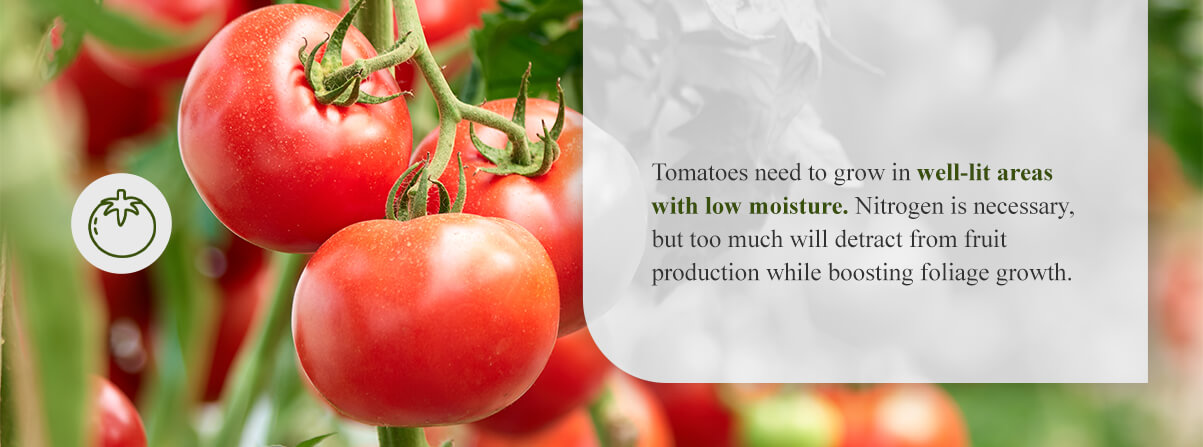Limestone and Tomatoes
Growing plump, vibrant tomatoes is an art and a science. You need to create an environment that encourages healthy tomato growth. Using fertilizers like lime can improve your harvest if you do so carefully.
What Is Limestone?
Limestone is a type of sedimentary rock that sprinkles the Earth after wind and water carry broken pieces away from the original stone. The particular mineral that comprises limestone is calcium carbonate, which crystallizes in the form of calcite and aragonite.
The mineral has various properties that provide value when regulating soil acidity. Consequently, fertilizer manufacturers use limestone to create a product called lime. Lime contains multiple oxides and hydroxides, like calcium oxide and calcium hydroxide.
What Can Lime Do for a Garden?
Lime conditions soil, which helps regulate the soil’s chemical composition. Gardeners and farmers must consider the soil’s chemical composition when planting fruits and vegetables. The substances in the ground control the nutrients that the plants will or won’t receive.
Monitoring and controlling soil acidity is crucial. Plants will fail to retain key nutrients if the soil is too acidic. However, soil that’s too basic causes issues, as well. Striking a balance is important.
Lime lowers acidity when it’s too high, improving the soil’s structure to support crops, hold nutrients and retain water. Reducing the acidity to a neutral level allows plants to grow more robust root systems. Lime also supplements essential minerals like calcium and magnesium that help plants absorb the nutrients present in the soil.

The Ideal Conditions for Growing Tomatoes
To consider how limestone impacts tomatoes, first understand the conditions that allow healthy tomatoes to grow.
Tomatoes need to grow in well-lit areas with low moisture. Nitrogen is necessary, but too much will detract from fruit production while boosting foliage growth.
The ideal pH for tomato growth is 6.2-6.8, which is slightly acidic but close to neutral. You can monitor your garden’s soil pH using a soil testing kit. If the soil’s acidity is too high, lime can raise the pH level closer to the ideal balance.
Is Lime Good for Tomatoes?
Lime and tomatoes have a complex relationship. Lime offers substantial benefits for tomatoes. Lime’s ability to raise soil’s pH level helps foster the slightly acidic conditions needed for growth. However, too much lime will raise the soil’s pH too high. It’s important to apply the appropriate amount of fertilizer for the situation and allow enough time for it to take effect.
Benefits of Using Lime in Tomato Gardening
Liming tomato plants accomplishes three key functions that produce significant benefits. Adding lime to the soil will raise its pH, increase the amount of calcium and enhance soil permeability.
- pH increase: Raising pH when soil is too acidic helps tomatoes absorb important nutrients like magnesium and phosphorus.
- Calcium increase: Absorbing calcium helps tomatoes grow vital, healthy cells and roots to stave off blossom end rot.
- Permeability increase: Lime makes it easier for water to drip through the solid and reach the roots, providing an overall health boost.
Balance Is Critical
While lime benefits tomatoes in a few crucial ways, it can cause harm if you use too much. Raising the pH beyond 6.8 may prevent the tomato plant from absorbing magnesium, a mineral vital to photosynthesis. Check your soil’s acidity and magnesium content before adding lime. Lime is an excellent solution if the soil is acidic and lacks magnesium.
Order Limestone From Baker Lime
At Baker Lime, we provide agricultural limestone that helps grow healthy tomatoes at any scale. Apply our limestone to your backyard garden or commercial farm to regulate your soil’s acidity and grow delicious tomatoes.
Baker Lime has over a century of experience in agricultural limestone, so get in touch for more on our lime products and how you can use them.








